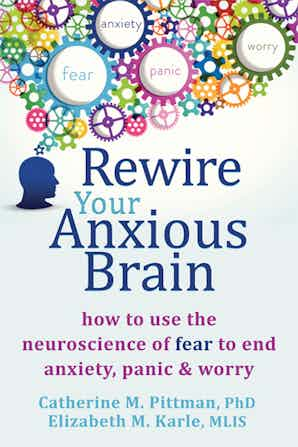
Train Your Mind, Change Your Brain: How a New Science Reveals Our Extraordinary Potential to Transform Ourselves

By Sharon Begley, The Dalai Lama (foreword), Daniel Goleman (preface) — 2007
In this fascinating and far-reaching book, Newsweek science writer Sharon Begley reports on how cutting-edge science and the ancient wisdom of Buddhism have come together to reveal that, contrary to popular belief, we have the power to literally change our brains by changing our minds. See more...
FULL SUMMARY
In this fascinating and far-reaching book, Newsweek science writer Sharon Begley reports on how cutting-edge science and the ancient wisdom of Buddhism have come together to reveal that, contrary to popular belief, we have the power to literally change our brains by changing our minds. Recent pioneering experiments in neuroplasticity—the ability of the brain to change in response to experience—reveal that the brain is capable of altering its structure and function, and even of generating new neurons, a power we retain well into old age. The brain can adapt, heal, renew itself after trauma, compensate for disabilities, rewire itself to overcome dyslexia, and break cycles of depression and OCD. And as scientists are learning from studies performed on Buddhist monks, it is not only the outside world that can change the brain, so can the mind and, in particular, focused attention through the classic Buddhist practice of mindfulness. With her gift for making science accessible, meaningful, and compelling, Sharon Begley illuminates a profound shift in our understanding of how the brain and the mind interact and takes us to the leading edge of a revolution in what it means to be human.
YOU MIGHT ALSO LIKE
CLEAR ALL
BY TOPIC
BY TEACHER
BY TYPE
FILTER

TOPIC
- Neuroscience (21)
- Awareness (20)
- Consciousness (19)
- Healing Approaches (19)
- Mindfulness Meditation (16)
- Neuroplasticity (16)
- Neuropsychology (15)
- Quantum Physics (13)
- Spiritual Growth (13)
- Compassion (12)
- Inner Peace (12)
- Spiritual Awakening (12)
- Stress Management (12)
- Anxiety (11)
- Mind-Body Connection (11)
- Self-Healing (11)
- Spiritual Development (11)
- Happiness (10)
- Well-Being (10)
- Connection with Nature (9)
- Emotional and Mental Health (9)
- Enlightenment (9)
- Human Potential (8)
- Inner Life (8)
- Self-Development (8)
- Self-Discovery (8)
- Spiritual Practices (8)
- Tibetan Buddhism (8)
- Interdependence (7)
- Psychology and Spirituality (7)
- Building Character (6)
- Conscious Evolution (6)
- Gender and Spirituality (6)
- Honoring Emotion (6)
- Integrative Medicine (6)
- Self-Compassion (6)
- Spiritual Life (6)
- Brain Health (5)
- Breathwork (5)
- Buddha Nature (5)
- Depression (5)
- Forgiveness (5)
- Love (5)
- Psychological Approaches (5)
- Psychology (5)
- Resilience (5)
- Self-Reflection Practices (5)
- Spiritual Direction (5)
- Suffering (5)
- Values (5)
- Zen Buddhism (5)
- Addiction Recovery (4)
- Altered States (4)
- Anger (4)
- BIPOC Well-Being (4)
- Confidence (4)
- Dharma (4)
- Epigenetics (4)
- Female Empowerment (4)
- Gratitude (4)
- Insight (Vipassana) Meditation (4)
- Intention (4)
- Life Challenges (4)
- Lovingkindness (4)
- Perception (4)
- Positive Psychology (4)
- Self-Care (4)
- Self-Mastery (4)
- Trauma Healing (4)
- Visions and Hallucinations (4)
- Wholeness (4)
- Addiction (3)
- Alcohol Addiction (3)
- Chronic Health Conditions (3)
- Cognition (3)
- Comparing Belief Traditions (3)
- Ego (3)
- Focus (3)
- Freedom (3)
- God (3)
- Guided Meditation (3)
- Holism (3)
- Imagination and Creativity (3)
- Inner Strengths (3)
- Islam (3)
- Joy (3)
- Judaism (3)
- Living with Illness (3)
- Mysticism (3)
- Naturopathy (3)
- Near-Death Experience (3)
- Sacred Feminine (3)
- Self-Control (3)
- Self-Realization (3)
- Spiritual Healing (3)
- Stress (3)
- The Unconscious (3)
- Transformation (3)
- Trauma (3)
- Walking Meditation (3)
- Women’s Well-Being (3)
- Acceptance (2)
- Afterlife (2)
- Aging (2)
- Authenticity (2)
- Awe (2)
- Belonging (2)
- Black Well-Being (2)
- Christianity (2)
- Creative Well-Being (2)
- Death and Dying (2)
- DMT (2)
- Dreamwork (2)
- Ecospirituality (2)
- Ego Dissolution (2)
- Emotional Intelligence (EQ) (2)
- Empathy (2)
- Empowerment (2)
- Energy Healing (2)
- Entrepreneurship (2)
- Fear (2)
- Finding Meaning (2)
- Forest Bathing (2)
- Generosity (2)
- Grit (2)
- Illness and Injury (2)
- Indigenous Healing Approaches (2)
- Intimacy (2)
- Intuition (2)
- Karma (2)
- Leadership (2)
- Lifestyle Medicine (2)
- Longevity (2)
- Memory (2)
- Mental Health Challenges (2)
- Moral Philosophy (2)
- Native American Beliefs (2)
- Negative Self-Talk (2)
- Oneness (2)
- Passion (2)
- Past Lives and Reincarnation (2)
- Peak Performance (2)
- Personal Development (2)
- Physical Health (2)
- Prayer (2)
- Presence (2)
- Religious Experience (2)
- Search for Purpose (2)
- Self-Actualization (2)
- Self-Limiting Beliefs (2)
- The Divine (2)
- AAPI Well-Being (1)
- Accepting Love (1)
- Access to Education (1)
- Anger Management (1)
- Athlete Well-Being (1)
- Autism (1)
- Ayurveda (1)
- Biofeedback (1)
- Body Scan Meditation (1)
- Burnout (1)
- Caregiver Well-Being (1)
- Celibacy (1)
- Chakras (1)
- Channeling (1)
- Child’s Trauma (1)
- Children’s Well-Being (1)
- Clairvoyance and Precognition (1)
- Climate Change (1)
- Cognitive Behavioral Therapy (1)
- Cognitive Psychology (1)
- Communication Skills (1)
- Compassion Meditation (1)
- Connection (1)
- Courage (1)
- Diet and Nutrition (1)
- Disabled Well-Being (1)
- Disconnection (1)
- Divination Systems (1)
- Divorce and Breakup (1)
- Drug Addiction (1)
- Dysfunctional Childhood (1)
- Ego Transcendence (1)
- Embodiment (1)
- Facing Own Death (1)
- Faith (1)
- Fellowship and Community (1)
- Functional Medicine (1)
- Gender Identity (1)
- Gender Justice (1)
- Genetics (1)
- Global Challenges (1)
- Grace (1)
- Handling a Loved One’s Illness (1)
- Heartmath (1)
- Hinduism (1)
- Homeopathy (1)
- Humility (1)
- Identity (1)
- Indigenous Well-Being (1)
- Integrity (1)
- Intergenerational Trauma (1)
- Internal Family Systems (1)
- Jungian Analysis (1)
- Kindness (1)
- Letting Go (1)
- Lovingkindness Meditation (1)
- Managing Energy (1)
- Marriage (1)
- Memoir (1)
- Mythology (1)
- Neoshamanism (1)
- Neurodiversity (1)
- OCD (1)
- Offering Support to Others (1)
- Philosophical Approaches (1)
- Plant-Based Medicine (1)
- Play (1)
- Poetry (1)
- Positive Self-Talk (1)
- Problem Solving (1)
- Productivity (1)
- Psychedelic Research (1)
- Psychoanalysis (1)
- Racial Healing (1)
- Racism (1)
- Raising Nonbinary Children (1)
- Reiki (1)
- Relationship Challenges (1)
- Relationship with Time (1)
- Ritual (1)
- Romantic Relationships (1)
- Runes (1)
- Self-Acceptance (1)
- Self-Love (1)
- Self-Pressure (1)
- Sexuality (1)
- Shame (1)
- Sleep (1)
- Sleep Disorders (1)
- Social Justice (1)
- Social Responsibility (1)
- Soul Mission (1)
- Spiritual Quest (1)
- Spirituality and Health (1)
- Spirituality and Politics (1)
- Storytelling (1)
- Sustainability (1)
- Sutras (1)
- Taoism (1)
- Telepathy (1)
- The Feldenkrais Method (1)
- The Yips (1)
- Traditional Chinese Medicine (1)
- Transcendent Experience (1)
- Transpersonal Psychology (1)
- Trust (1)
- Unfulfilled Career (1)
- Vulnerability (1)
- War (1)
- Work Challenges (1)
- Work-Life Balance (1)
- Yoga (1)
- Yoga Therapy (1)
- Young Adult Well-Being (1)
- Youth Activism (1)
- Zen Meditation (1)
FILTER

TEACHER
- Sylvia Boorstein (6)
- Amit Goswami (5)
- Buddha (5)
- Bhikku Anālayo (4)
- Chögyam Trungpa (4)
- Daniel J. Siegel (4)
- Matthieu Ricard (4)
- Pema Chödrön (4)
- Pierre Teilhard de Chardin (4)
- Daniel Goleman (3)
- Ervin László (3)
- Jack Kornfield (3)
- Joanna Macy (3)
- Joseph Goldstein (3)
- Larry Dossey (3)
- Norman Fischer (3)
- Rupert Sheldrake (3)
- Sandy Boucher (3)
- Sharon Salzberg (3)
- Bernie S. Siegel (2)
- Charles Johnson (2)
- Charlotte Joko Beck (2)
- David Bohm (2)
- Fritjof Capra (2)
- Gaylon Ferguson (2)
- Jan Willis (2)
- Jean Houston (2)
- Ken Wilber (2)
- Lodro Rinzler (2)
- Martin Seligman (2)
- Mihály Csíkszentmihályi (2)
- Peter Russell (2)
- Ram Dass (2)
- Rick Strassman (2)
- Rudolph Ballentine (2)
- Ruth Denison (2)
- Seyyed Hossein Nasr (2)
- Stephan Bodian (2)
- Tara Brach (2)
- Yongey Mingyur Rinpoche (2)
- Abraham Maslow (1)
- Alanis Morissette (1)
- Andrew Weil (1)
- Andy Puddicombe (1)
- Ann Druyan (1)
- Arnold Mindell (1)
- Ashley Neese (1)
- Bruce Lipton (1)
- Chan Khong (1)
- Charles Tart (1)
- Daisaku Ikeda (1)
- Dave Asprey (1)
- David R. Hawkins (1)
- Deepak Chopra (1)
- Diane Stein (1)
- Dorothy Day (1)
- Eben Alexander (1)
- Edgar Mitchell (1)
- Elizabeth Gilbert (1)
- Ellen Langer (1)
- Forrest Hanson (1)
- Frans Stiene (1)
- Gary Gach (1)
- Gary Zukav (1)
- Gregg Braden (1)
- Heidi Campbell (1)
- Howard Gardner (1)
- Huston Smith (1)
- J. Krishnamurti (1)
- James Hillman (1)
- Jetsunma Tenzin Palmo (1)
- Joan Halifax (1)
- JoAnna Hardy (1)
- John Welwood (1)
- Joseph Campbell (1)
- Joseph M. Marshall III (1)
- Judith Blackstone (1)
- Lama Rod Owens (1)
- Lama Tsultrim Allione (1)
- Linda Graham (1)
- Lisa Feldman Barrett (1)
- Lisa Wimberger (1)
- Louise Hay (1)
- Marc Ian Barasch (1)
- Marie-Nathalie Beaudoin (1)
- Matthew Fox (1)
- Maya Angelou (1)
- Michio Kaku (1)
- Mirabai Bush (1)
- Moshé Feldenkrais (1)
- Naomi Shihab Nye (1)
- Noah Levine (1)
- Oprah Winfrey (1)
- Phillip Moffitt (1)
- Queen Afua (1)
- Raymond Buckland (1)
- Richard Davidson (1)
- Rick Fields (1)
- Rumi (1)
- Ruth King (1)
- Sam Harris (1)
- Shauna Shapiro (1)
- Shunryu Suzuki (1)
- Stephen Mitchell (1)
- Ted DesMaisons (1)
- Terence McKenna (1)
- Viktor E. Frankl (1)
- Wendell Berry (1)








